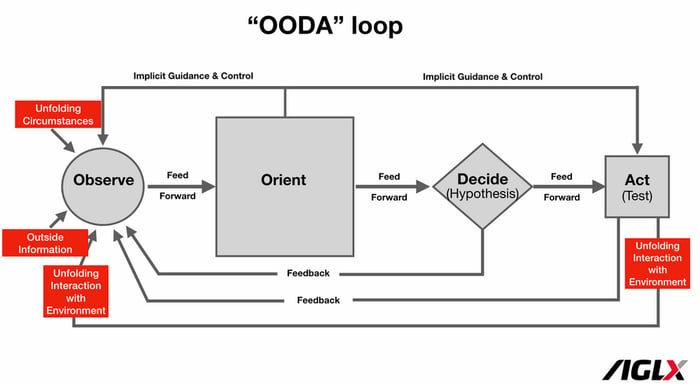
I was introduced to Constraint-Led Approach a few weeks ago during the Navy’s Complexity Workshop. At the workshop, I was shown the book, Constraint-Led Approach: Principles for Sports Coaching and Practice Design by Renshaw, Davids, Newcombe, and Roberts and have since purchased the book. I’m half-way through the sports coaching book and although the OODA loop is not mentioned, I now have a new perspective on the Orientation step of the OODA loop as well as a new appreciation for the three explicit feedback links found in the OODA loop sketch: Unfolding Interaction with Environment, Unfolding Circumstances, and Outside Information.
The components found in the OODA loop’s Orientation step and three external feedback links represent constraints.
Constraint: a feature of the environment which acts as information to shape or guide the (re)organization of a complex adaptive system [1].
In the book, the authors identify three main constraints:
- Organismic constraints refer to the personal characteristics of each individual such a genes, cognitions and patterns of thinking, amount of previous experience and learning, motivation, and emotions, feelings, and desires.
- Environmental constraints are more global, and consist of physical variables in nature such as ambient light, temperature, or altitude, or social features such as historical, cultural, and societal values, beliefs and customs
- Task constraints are more specific to performance contexts and include task goals and specific rules associated with an activity.
The authors point out that these main constraints interact at different time scales and operate to select emergent patterns of behaviors in a continuous ‘adaptation + feedback’ loop.
This is worth exploring!
1 I. Renshaw, K. Davids, D. Newcombe and W. Roberts, The Constraints-Led Approach: Principles for Sports Coaching and Practice Design, New York, NY: Routledge, 2019.

